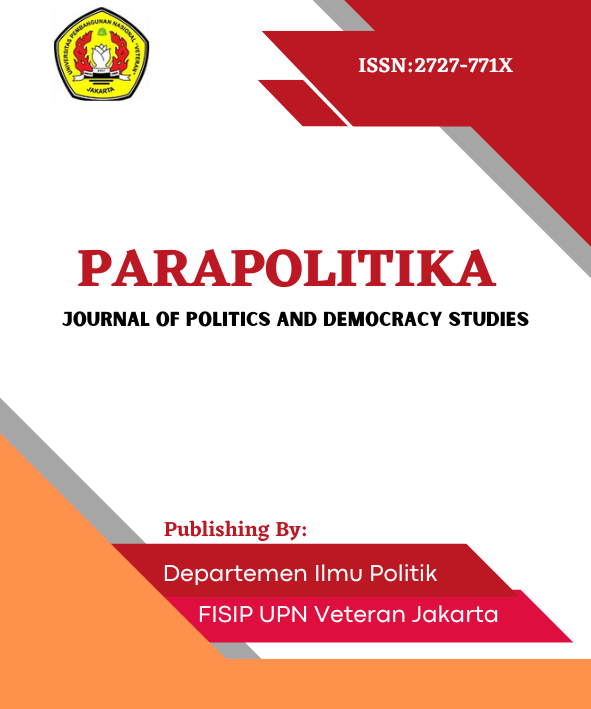MASALAH-MASALAH PARTAI POLITIK INDONESIA
Keywords:
political party, party funding, corruption, money politics, representation, patronage, clientelismAbstract
This research departed from the low score of political parties in Indonesian Democracy Index. Assuch, this paper tries to analyze as to the primary problems faced by political parties in the era of reformation with previously giving historical backgrounds regarding to political parties’ transformation in Indonesia. The main purpose of this research is to identify obstacles and opportunities so as to strengthening political parties towards consolidated democracy. The study finds that there are three main issues faced by political parties in reform era, which are corruption, money politics, and the failure of political representation. other problems are about accountability, transparency, and political party funding, in which the income and the outlay of political parties are not balanced so that triggering the possibility of corruption. Subsequently, there are some challenges which later known in the effort of strengthening political parties, which are patronage, clientelism, and supervising policy by government.
References
Ambardi, K. (2008). Mengungkap Politik Kartel : Studi Tentang Sistem Kepartaian di Indonesia Era Reformasi. Jakarta : Kepustakaan Populer Gramedia
Amalia, L.S., e. (2016) Pemilu Legislatif 2014: Analisis Proses dan Hasil. Jakarta: LIPI.
Ardiansa, D. (2016). Menghadirkan Kepentingan Perempuan dalam Representasi Politik di Indonesia. Jurnal Politik Vol 2. No 1, 71-99.
Aspinall, E., & Mietzner, M. (2010). Problems of Democratization in Indonesia: Elections, Institutions, and Society. Singapore: ISEAS.
Aspinall, E., & Sukmajati, M. (2015). Politk Uang di Indonesia, Patronage dan Klientalisme pada Pemilu Legislatif 2014. Yogyakarta: PolGov UGM.
Asshiddiqie, J. (2007). Pokok-Pokok Hukum Tata Negara Indonesia Pasca Reformasi. Jakarta: BIP.
Badoh, I. F., & Djani, L. (2006). Korupsi Pemilu. Jakarta: ICW.
BAPPENAS. (2018). Penyusunan Background Study RPJMN 2020-2024 Bidang Politik dan Komunikasi Sub Bidang Kelembagaan Demokrasi. Jakarta: BAPPENAS.
BAPPENAS, D. (2016). Tinjauan Peran Partai Politik dalam Demokrasi di Indonesia. Jakarta: BAPPENAS.
Boudreau, V. (2009). Resisting Dictatorship: Repression and Protest in Southeast Asia .Cambridge: Cambridge University Press.
Bunte, M., & Ufen, A. (2009). Democratization in Post-Suharto Indonesia. New York: Routledge.
Cohen, J. L., & Arato., A. (1992). Civil Society and Political Theory. Cambridge: Massachusetts Institute of Technology Press.
Dirk Tomsa. (2008). Party Politics and Democratization in Indonesia : Golkar in The Post Soeharto Era. London: Routledge.
Gilbert, M. (2006). A Theory of Political Obligation: Membership, Commitment, and the Bonds of Society. Oxford: Oxford University Press.
Haramain, Malik, dan M.F Nurhuda. (2000). Mengawal transisi: Refleksi atas pemantauan Pemilu 1999 . Jakarta: UNDP dan JAMPPI.
Gunther, R. and Diamond, L. (2003). “Species of Political party: a New Typology”, Party Politics. vol.9 No. 22. London: Sage Publications.
Hyden, G., Court, J., & Mease, K. (2013, July). Political Society and Governance in 16 Developing Countries. World Governance Survey Discussion Paper 5 .
Junaidi, V,. e. (2011). Anomali Keuangan Partai Politik: Pengaturan dan Praktek. Jakarta : Kemitraan bagi Pembaruan Tata Pemerintahan.
Klinken, G. v. (2007, July 1). Communal Conflict and Decentralisation in Indonesia (July 1,2007). The Australian Centre for Peace and Conflict Studies Occasional Paper , p. 18






